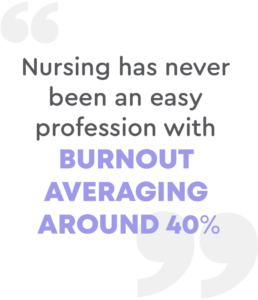Nurse Burnout: 4 Ways To Help Your Healthcare Workers Cope
 It takes a particular skill set and sense of purpose to become a healthcare worker. It’s a job that requires extreme attention to detail, compassion for every patient, and intricate knowledge of the human body, diseases, and medications. It takes not only a special person, but a strong one – especially when cases of healthcare worker burnout are on the rise. We’ve spoken with our partners in healthcare and they have suggested a few ways you can avoid nurse burnout.
It takes a particular skill set and sense of purpose to become a healthcare worker. It’s a job that requires extreme attention to detail, compassion for every patient, and intricate knowledge of the human body, diseases, and medications. It takes not only a special person, but a strong one – especially when cases of healthcare worker burnout are on the rise. We’ve spoken with our partners in healthcare and they have suggested a few ways you can avoid nurse burnout.
Healthcare has never been an easy profession with burnout averaging approximately 40%. The COVID-19 pandemic in 2020 only made the healthcare profession more difficult, increasing burnout levels up to 70%. Not only that, but turnover rates for new healthcare workers skyrocketed up to 60% with new graduates. Avoid nurse burnout by implementing new procedures and prioritizing your greatest asset: your staff.
1. Commit To A Culture Of Continuous Improvement to Avoid Nurse Burnout
New hires may sign on for higher salaries and benefits, but if their mental health suffers, they won’t stay regardless of how good the coffee and donuts are on Nurse Appreciation Week. Medical organizations need to speak and act on continuously improving their culture.
Form a task force across multiple departments of various levels of employees and identify pain points of the organization that can be corrected for healthcare workers. This may lead to adding a Chief Wellness Officer to the c-suite or creating new positions to oversee protocols and systems that keep healthcare wellbeing as a top priority.
2. Offer Shorter Shifts And More Flexibility
It is standard to hear of physicians working 12-hour shifts in a hospital. According to the National Library of Medicine, “nurses working shifts of ten hours or longer were up to two and a half times more likely than nurses working shorter shifts to experience burnout and job dissatisfaction and to intend to leave the job.”
The type of shifts hospitals need is dependent on the organization. But if it’s possible, make six to eight-hour shifts the standard. Make it a policy to not call nurses on their days off unless absolutely necessary, and make requirements of what constitutes “absolutely necessary.” Respect healthcare workers’ time to rest and recoup so they can come back to work refreshed and mentally prepared to start a new day.
3. Align Your Benefits With Mental Health and Wellness
Give your workers options for prioritizing emotional support within the workplace. Mental Health America reports that 45% of nurses feel that they do not have an adequate amount of emotional support. Make it policy for healthcare workers to check in with mental health care providers at regular intervals. Alternatively, you can offer support groups for healthcare workers in your organization to come together and discuss their challenges and what is weighing heavily on them.
Review your benefit package and ask how it assists healthcare workers with their mental health, outside of an Employee Assistance Package (EAP). Consider offering tuition reimbursement for liberal arts classes, such as art, music lessons, social sciences, or whatever the employee might be interested in that is not related to their job.
This type of benefit encourages healthcare workers to take a scheduled break from medicine and stress and focus on something that they enjoy learning about. It’s a brain break, but is also something for them to focus on themselves and something they love and hopefully finds relaxing, which will help them recharge as they prepare for another day on the floor.
Sometimes just knowing and acknowledging that there are others in the storm with you, is enough to keep you going in a challenging profession. Whatever you decide is right for your organization and resources, give your frontline workers opportunities to speak about their experiences and how they are processing their challenges.
4. Conduct Stay Interviews
You won’t know what your employees are feeling and struggling with unless you ask them directly. Conduct stay interviews with all your employees at regular intervals and ask them what is working and what is not. They should feel comfortable telling you what resources are lacking, and then it’s your job to figure out how to fix that pain point.
Using a one-way interview tool allows you to quickly and easily set up asynchronous employee interviews that allow them to give feedback on their role and the organization. Send out your feedback interview to employees and review their responses whenever you have an opportunity.
Avoid Nurse Burnout with interviewstream’s Recruiting Tools
Medical organizations need to act quickly to right the ship and get their staff back on board. If you need assistance, contact one of our hiring experts to discuss how our services can not only assist in assuring quality of hire, but also be used to increase staff retention and prevent nurse burnout.
About The Author
Caroline Chessia is the Marketing Operations Specialist at interviewstream. She loves color-coordinated graphs, hiking in the mountains, and every dog she meets—especially the Golden Retrievers.
